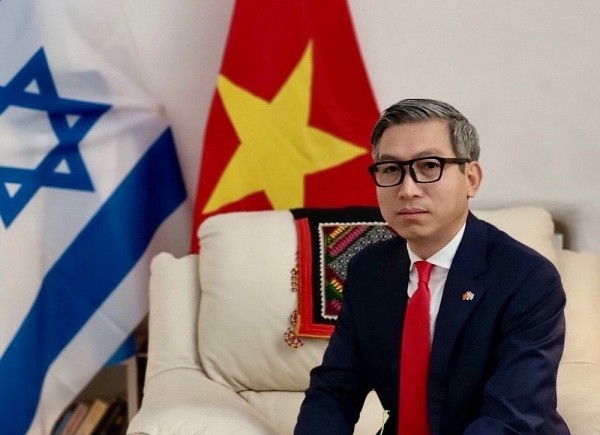
| VIFTA: Vietnam-Israel Boulevard opened | |
|
8/28/2023 9:29:44 AM Israel is the first country in West Asia that Vietnam has signed an FTA with, while Vietnam is the first country in Southeast Asia with which Israel has signed an FTA. Through this cooperation, Vietnam and Israel expect to make significant progress in investment, services, digital transformation and technology.
Unlimited cooperationVIFTA consists of 15 chapters and appendices attached to the chapters with basic contents such as trade in goods, services - investment, rules of origin, technical barriers to trade (TBT), measures to Sanitary and phytosanitary (SPS), customs, trade remedies, government procurement, legal - institutional. With the achievement of agreements in all chapters of the agreement, especially the strong commitment of the two sides to raise the rate of trade liberalization with the overall liberalization rate towards the end of the commitment schedule of the two sides. Israel is 92.7% of tariff lines, while Vietnam is 85.8% of tariff lines, the two sides expect two-way trade to grow dramatically, soon reaching the target of 3 billion USD and higher in the future. next time.
Due to the non-competition in economic structure, bilateral cooperation is considered to have many advantages, the products of the two countries often do not compete but complement each other’s markets. Bilateral import and export activities will fill the gap in each other’s economies, promoting each other’s development in the coming years. According to the representative of the Federation of Israeli Chambers of Commerce (FICC) - Mr. Ze’ev Lavie, the goods that Israel has great import demand are also those with the export strength of Vietnam. Israeli importers are interested in the Vietnamese market and consider Vietnam a stable source of goods, services and logistics in Asia for Israel. Israel is currently one of Vietnam’s major trade, investment and labor partners in West Asia. VIFTA will contribute to reducing production and business costs, improving the competitiveness of Vietnamese goods in neighboring markets such as the Middle East, North Africa, and Southern Europe. In contrast, along with Vietnam’s population of more than 100 million people, Israeli goods and technology have the opportunity to access markets in Southeast Asia, Asia-Pacific and other major economies participating in 16 FTAs. to which Vietnam participated. More visible in West AsiaVIFTA will help Vietnam both diversify, multilateralize and expand trade relations with West Asia and Southwest Asia - an area that currently has relatively limited economic relations and wishes to open. at the same time, diversifying investment sources in the context of the world economy is still facing many difficulties. According to experts, the agreement clearly shows Vietnam’s policy of comprehensive and deep integration into the world economy and expanding relations with all economies. At the same time, the agreement helps to diversify the import and export markets for Vietnamese goods, as well as to enjoy easier tariff preferences for Israeli high-tech products and goods. The highlight of Israel is a high-tech economy, with significant advances in technology and scientific research, comparable to the leading developed countries in the world, especially technology in agriculture. Karma. Therefore, this FTA will not only further open up trade relations between the two countries but also attract investment in high-tech agriculture - an area that Vietnam needs but has not developed commensurate with its potential. Recently, Vietnam tends to have a trade deficit from Israel due to the high value of computers, circuit boards and electronic components for manufacturing and processing finished products in Vietnam in the chain of activities of enterprises. have foreign investment capital in industrial parks. Besides, with the goal of conquering the West Asian market, Israel plays the role of a "springboard" for Vietnamese goods to be more present and to access more opportunities in this region. Find opportunities in Southeast AsiaIsrael is a small country but has a very strong foreign trade economy. Israel’s population is only 1/10 of Vietnam’s, about 10 million people, but the per capita income is about 55,000 USD/year. Israel’s annual trade averages over $173 billion. Without abundant resources, up to 70% of the area is desert, Israel mainly imports, especially consumer goods. According to published data, each year, Israel’s import turnover is about 35 billion USD for this item. According to analysis by Asian News International, Israel’s interest in Vietnam is also due to great opportunities in Southeast Asia. Vietnam is considered an important member in ASEAN - where Israel does not have diplomatic relations with some other members such as Malaysia and Indonesia. According to the President of the Israel - Vietnam Chamber of Commerce (IVC) Einat Halevy Levin, “Vietnam is the best access point from which Israel can develop economic relations with other ASEAN countries. Taking advantage of tariff preferences, Israeli goods can better compete with similar products from other countries with which Vietnam already has free trade relations. Halevy Levin said, “The business environment in Vietnam has become much more favorable. Israeli companies understand that, if they want to set foot in Southeast Asia, Vietnam is a good starting point, better than other countries. However, according to Ms. Halevy Levin, due to cultural differences, the biggest obstacle that Israeli entrepreneurs often face is not spending time learning about business culture in Vietnam. While the challenge for Vietnamese businesses is about competitiveness. Israel is a partner with great competitiveness, very developed science and technology, so the consumer goods that Vietnam exports to must pay special attention to improving the quality. | |
| BaoQuocte.vn |
